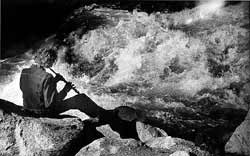Time, Space Obsolete in New View of Universe
The concept rejects several familiar notions and includes the existence of 11 dimensions.
By K.C. COLE, Times Science Writer
Ever since early astronomers yanked Earth from center stage in the solar system some 500 years ago, scientists have been pulling the rug out from under people's basic beliefs.
"The history of physics," says Harvard physicist Andrew Strominger, "is the history of giving up cherished ideas."
No idea has been harder to give up, however--for physicists and laypeople alike--than everyday notions of space and time, the fundamental "where" and "when" of the universe and everything in it.
Einstein's unsettling insights more than 80 years ago showed that static space and fixed time were flimsy facades, thinly veiling a cosmos where seconds and meters ooze like mud and the rubbery fabric of space-time warps into an unseen fourth dimension.
About the same time, the new "quantum mechanical" understanding of the atom revealed that space and time are inherently jittery and uncertain.
Now, some physicists are taking this revolutionary line of thinking one step further: If their theories are right, in the words of Edward Witten of the Institute for Advanced Study in Princeton, space and time may be "doomed."
Concurs physicist Nathan Seiberg, also of the institute: "I am almost certain that space and time are illusions. These are primitive notions that will be replaced by something more sophisticated."
That conclusion may not affect anyone's morning commute. But it is rocking the foundations of physics--as well as causing metaphysical reverberations that inevitably follow major changes in our fundamental understanding of how the universe works.
The impetus behind this tumult is an idea that has become increasingly dominant in modern physics: string theory. According to string theory, the most basic ingredients in the universe are no longer point-like particles, the familiar electrons and quarks. Instead, they are unimaginably small vibrating strings of some unknown fundamental stuff.
String theory suggests that different configurations of strings produce different harmonic chords--just as a piano produces a sound different from that of a flute. The vibrating string gives rise to the particles, and the way the string vibrates determines each particle's properties. This all takes place in a convoluted landscape of 11-dimensional space.
It is a concept so strange that even theoretical physicists struggle to understand it. String theory offers a universe bizarre beyond imagining: Under powerful enough magnification, every known particle in the universe would resemble a complex origami folded out of sheets or strings of the three familiar spatial dimensions, plus one dimension of time, plus seven extra dimensions of space.
While string theory is far from proven, or even well formulated, its consequences would be enormous. Among other things, it would:
* Reshape fundamental notions of space and time, energy and matter, expanding the number of dimensions to 11.
* Give the first comprehensive list of all the ingredients that make up the universe.
* Reveal that every tick of a clock, every barking dog, every dying star, can be described by one master mathematical equation.
Being Involved in a 'Scientific Revolution'
Which practical fruits will flow from the new view of the universe remain unknown. But in the past, fundamental revolutions in physics have--against everyone's wildest expectations--flowered into everything from cell phones to brain scans.
"I've been in physics for 35 years, and this is the first time I've felt I'm involved in a scientific revolution," said Stanford physicist Leonard Susskind.
"In the last five or six years, I really have the feeling we're doing something as crazy, as interesting, as new as the revolution that Einstein wrought."
Perhaps most revolutionary of all, it appears that space and time aren't essential ingredients of a universe ruled by strings.
To grasp the extent of the current upheaval in physics, consider what has happened to our basic understanding of space and time over the past hundred years.
Until the early 20th century, scientists, like laypeople, assumed that space and time were fixed--like huge, metaphysical clocks and rulers in the firmament.
Objects that moved in this unchanging background could be pinned down to definite positions.
"Everything was where it was when it was supposed to be, and that was all there was to it," said Strominger. "Space-time was out there. You could count on it."
Then, Einstein revealed that space and time were woven into a single fabric that deforms like so much Silly Putty; indeed, it is the warping of the fabric of space-time by massive objects that produces the force of gravity.
We perceive gravity as a "force" only because we can't directly perceive the fourth dimension.
Because gravity affects everything, everything gets warped by its pervasive influence--including the clocks and rulers we use to measure time and space.
Even more unsettling, Einstein's now well-proven theories showed that the fabric of space-time, with its three dimensions of space and one of time, is not a passive backdrop for the events and objects in the universe. Space-time also creates objects and events.
Imagine the universe as a performance on a stage. The stage of space-time does not act like a static floor. It also pulls and pushes the actors around.
Quantum mechanics introduced even more uncertainty.
In the subatomic realm, the entire concept of fixed particles in time and space fuzzes out into an ever-shifting haze of probabilities. Trying to pin down a subatomic particle's location or motion is like trying to put your finger on a snowflake; the very act of measurement destroys the thing being measured.
"That means . . . space-time is an uncertain concept, so you've lost your firm footing," said Strominger.
"And that is a deep conceptual issue we have not yet come to grips with."
Now string theory appears to be propelling this evolution one drastic, perhaps inevitable, step further.
Certain approaches to string theory dispense with the notion of space-time completely. Yet, they seem to produce the same set of results as string theories with normal space and time.
To some theorists, this strongly suggests that space and time are superfluous. Space and time as fundamental concepts may be about to disappear altogether--literally pulling the floor out from under physics.
"The notion of space-time is something we've cherished for thousands of years, and it's clearly something we're going to have to give up," said Strominger.
Even before string theory enjoyed its recent successes, physicists knew they would have to grapple again with the inadequacy of our understanding of space and time. The reason is a glaring mismatch between gravity, which rules large-scale events in the cosmos, and quantum mechanics, which rules small-scale happenings.
Both gravity and quantum theory are well understood and have survived decades of experimental tests. Quantum mechanics gave rise to lasers and computers; Einstein's theory of gravity predicted everything from black holes to the bending of light by stars, insights since proved by observations.
The problem is, the two theories are mutually exclusive.
The space and time of quantum theory don't mesh with the space and time of Einstein's theory of gravity, or General Relativity.
In the language of gravity, the quantum mechanical aspects of the universe turn into gobbledygook. And vice versa.
"We can describe the world that we see and experience completely," said UC Santa Barbara physicist Sean Carroll, "but the explanations are internally inconsistent."
Some Things Don't Affect Everyday Life
Until recently, physicists found it easy to sweep this unpleasantness under the rug--in part because they didn't know how to deal with it, in part because it doesn't make a difference in our everyday lives.
The inherently uncertain behavior of subatomic particles affects only things as small as atoms, not everyday objects like chairs; the warping of space and time shapes the orbits of planets, but is too diluted to make itself felt on the scale of our own backyards.
Where the large-scale fabric of space-time gets tangled in the inner lives of atoms, however, chaos erupts; space and time fail to make sense. And increasingly, physicists find themselves face to face with situations where quantum mechanics and the extreme warping of space-time collide.
For example, physicists won't be able to understand either the innards of black holes or the origins of the universe until they come to grips with how gravity behaves at extremely small scales. Indeed, the ultimate laboratory for studying the collision of these two opposing realms is the infinitely compressed dollop of space-time that gave rise to the Big Bang.
That cataclysmic speck, physicists believe, contained everything now in our universe, so it would have packed a huge gravitational wallop. At the same time, it would have been small enough to behave according to quantum mechanical laws.
Because physicists can't study the Big Bang directly, they wind back the clock with equations and thought experiments--imagining what might happen, for example, if time really reversed.
The results are disturbing: As the universe gets smaller and smaller,
the warping of space-time gets stronger and quantum uncertainties get progressively larger.
Finally, the uncertainty becomes larger than any time interval that could possibly be measured. Measurement becomes meaningless.
Time at the first moment dissolves into nonsense.
"If you ask questions about what happened at very early times," said Harvard physicist Sidney Coleman, "and you compute the answer,
the [real] answer is: Time doesn't mean anything."
Or consider what happens inside a black hole--a region where gravity is so strong that space-time curls in on itself, in effect, shutting out the rest of the universe. Black holes are swirling pits of pure space-time.
And according to Einstein's theory, their enormous gravity causes them to collapse to an infinite point of zero size--what physicists call singularity. Is there such a nonsensical thing as infinite density packed into zero size?
"I remember puzzling about that when I was a kid," said Gary Horowitz of the Institute for Theoretical Physics at UC Santa Barbara. "I thought when I went to college I would find out the answer . . . I'm still waiting."
In the pinched-off centers of black holes, space-time appears to simply stop. "The singularity acts like an edge," said Horowitz. "You run into it, and it's the end. There's no time after that; there's no space after that. But we don't think physics should end [there]. That's why we're trying to" find new laws of physics, which will describe what happens beyond that edge.
Black holes, said Princeton physicist John Archibald Wheeler, "[teach] us that space can be crumpled like a piece of paper into an infinitesimal dot, that time can be extinguished like a blown-out flame, and that the laws of physics that we regard as 'sacred,' as immutable, are anything but."
Space, Time May Be Doomed as Concepts
String theory has emerged as the only viable candidate to reconcile the differences between gravity and quantum mechanics. It does so by eliminating the notion of infinitely small particles. The loop of string is the smallest allowable size.
"You never get to the point where the disasters happen," said Seiberg of the Institute for Advanced Study. "String theory prevents it."
But rather than rescuing space and time, string theory only seems to make their doom as fundamental concepts more imminent.
When they are incorporated into string theory, "space and time get confused," said Seiberg. "It's telling us that the traditional understanding of space and time will evaporate and there will be a more interesting and subtle result."
Some string theorists believe that space and time somehow emerged in the early universe out of the disorganized, 11-dimensional strings. The strings are "shards" of space and time, said physicist Brian Greene of Columbia University.
Imagine grains of sand on the surface of a drum. If you tap the surface over and over at the same place, the sand falls into patterns--like iron filings around a magnet.
Did space and time emerge in the same way, as resonant patterns of vibrating strings?
Trying to make sense of such an idea is a struggle even for theorists.
"String theory has been giving us a lot of clues," said Strominger, "but we haven't been able to put them together into a unified picture."
Even philosophically, the challenge of replacing space and time is daunting.
What does it mean to inhabit a spaceless, timeless universe? Clocks and rulers not only measure hours and inches; they tell us where we've been and where we're going.
"When we talk about space and time, we think there is something there, and we live in it," said David Gross, director of the Institute for Theoretical Physics. The idea that space and time might be illusions, he said, "is very disturbing.
Where are we? When are we?"
The almost unfathomable scenario of a universe without space and time in turn calls into question the very connection between cause and effect. If time can break down, how can one event be placed clearly "before" or "after" another?
Hypothetically, if there is no clear difference between now and the instant after, how can we say whether the gunshot caused death--or death caused the gunshot?
"We normally think of causality as a basic property," said Horowitz. "Something effects something else. But when you're getting rid of space and time . . . are we sure that causality is going to be preserved?"
New views of time could lead to even more bizarre consequences--for instance, more than two dimensions of time, a theory being worked on by USC physicist Itzhak Bars, among others.
Whatever the outcome of these efforts, it's clear, said Greene, that "space is undergoing a drastic rearrangement of its basic pieces; we will not understand string theory until we make a major breakthrough in notions of space and time."
If Greene and his colleagues are right, expanding the universe into 11 dimensions and looping it into strings are only the beginning.
On the horizon looms a new kind of physics, where space and time melt down completely.
"The real change that's around the corner [is] in the way we think about space and time," said Gross. "We haven't come to grips with what Einstein taught us.
But that's coming. And that will make the world around us seem much stranger than any of us can imagine."



















































